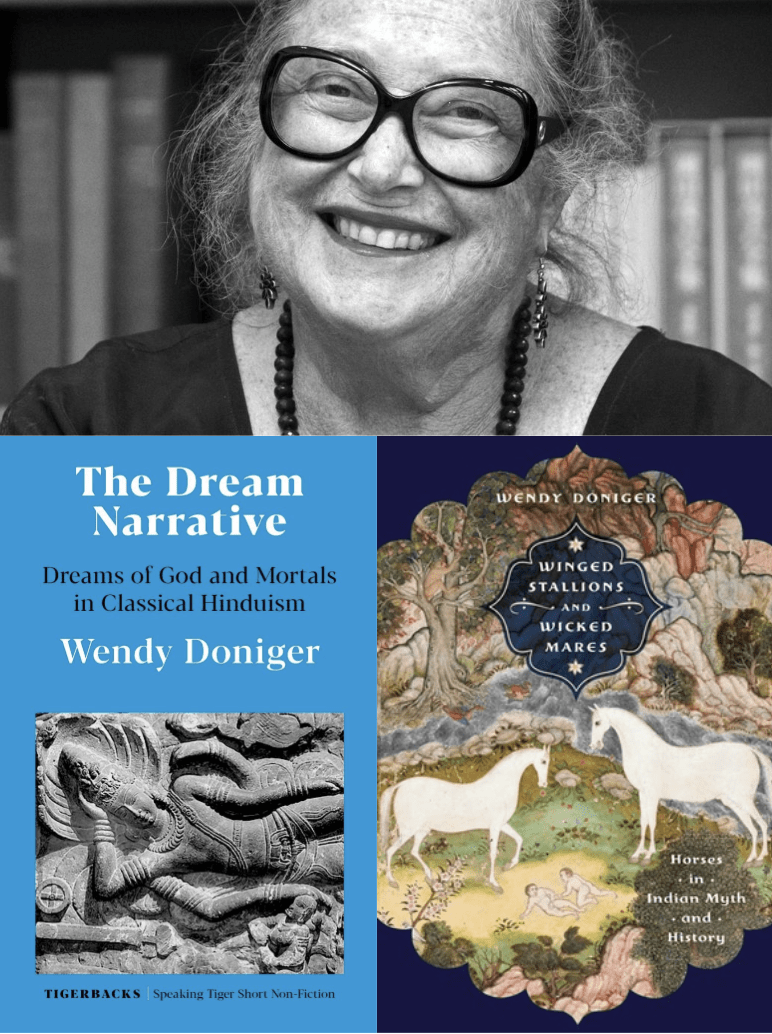Q: Congratulations on the publication of four new books in the last few years. Can you briefly summarize each?
- Winged Stallions and Wicked Mares: Horses in Indian Myth and History. Charlottesville and London: University of Virginia Press, 2021. New Delhi: Speaking Tiger, 2021. This is a book about the natural and cultural history of horses in India, the reasons why they did not thrive there and were therefore so expensive that they were owned only by very privileged people, but yet were an intrinsic and important part of the mythologies of everyone in India, including village artists who had never seen a horse.
- The Dream Narrative: Dreams of God and Mortals in Classical Hinduism. Delhi: Speaking Tiger, 2022. An expansion of some of the ideas I began in Dreams, Illusion, and Other Realities (1964) and continued to work on through the years.
- After the War: The Last Books of the Mahabharata. New York: Oxford University Press, 2022; Delhi: Speaking Tiger, 2022. A translation of books 16 – 18 and the second half of book 15.
- An American Girl in India: Letters and Recollections, 1963-64. Delhi: Speaking Tiger. 2022. SUNY, 2023. Bengali edition, 2023. A collection of the letters I wrote to my parents on my first trip to India, in 1963-4, interleaved with comments from me now, pointing out how wrong I was about so many things in 1963-4
Q: When and how did you first become interested in South Asia?
When I was in high school, in 1956-8, I learned Latin and a bit of Greek, and I read E M Forster’s A Passage to India and the Juan Maspero [terrible] translation of the Upanishads, and decided to study Sanskrit at Radcliffe when I entered in 1958. I wrote about this in another book, The Donigers of Great Neck: A Mythologized Memoir (The 2015 Mandel Lectures at Brandeis. Waltham, MA. University Press of New England/Brandeis University Press, 2019).
Q: What is your approach to research and collecting data? What is the most unexpected thing that has happened to you while researching?
I generally immerse myself in whatever Sanskrit texts seem relevant to what I am interested in, and eventually I get ideas about it all. Usually as I am finishing one book, I am left with a few unanswered questions and/or a few fascinating texts that didn’t quite fit into the now finished book, and that’s the basis of the next book. Rather like making yogurt: you have some yogurt left over from the last batch, and add warm milk, and voila! a new batch of yogurt. And once it’s started, one text leads me to another, and another, one question to another . . . ad infinitum. Every time after I finish a book I think of several things I wish I had had time to include, or several things I didn’t quite get right and want to try to do better in another book.
Q: What challenges, if any, did you face when writing your most recent books?
The challenge of a failing, aging memory: I am careful to write everything down as I think of it, as often I cannot recall the ideas later. And sometimes it takes a while for me to remember the precise word I want to use to express my thought.
Q: Do you have any upcoming projects or events we should keep an eye out for?
At the moment, I’m working on the stories that Bhishma tells Yudhishthira in answer to his questions in the Shanti and Anushasana Parvans of the Mahabharata. The questions are usually quite boring, all about technicalities of dharma, but the stories told to explain the principles are often weird or hilarious or otherwise fascinating.
My other project is a memoir, that I’ve been working on for years and years. I’ve waited until most of the people in my anecdotes are dead, and that’s just about happened now. The tentative title has always been, Horses for Lovers, Dogs for Husbands, but I think the most interesting part of it will be the story of my life as a woman in the heyday of sexism and the first stirrings of feminism in academia.
Q: With the addition of these four, how many books have you published?
It depends on what you count as books. I’ve published 24 books in which I had an idea and found the texts [or had a text and found the ideas] and wrote about it. Then there are 10 books that are translations of Sanskrit [or, occasionally, Greek] texts. Then there are 16 edited volumes. So it makes 50 altogether.
Q: What advice would you give to students interested in similar research?
Write about something that interests you personally, not something that is just academically fashionable or a subject whose only virtue is that no one has ever written about it or on which the only extant books are seriously flawed.
Q: How has your membership with COSAS helped you over the course of your career and successes?
Having colleagues, both teachers and students, who are themselves intellectually engaged in and excited about so many of the things that I have cared about has been essential for my work. I’ve read what they have written or are writing, and they have listened to my presentations of early versions of my works, and the feedback—the criticism, the encouragement, the suggestions for things I hadn’t thought about– has been an essential part of everything I’ve done.
